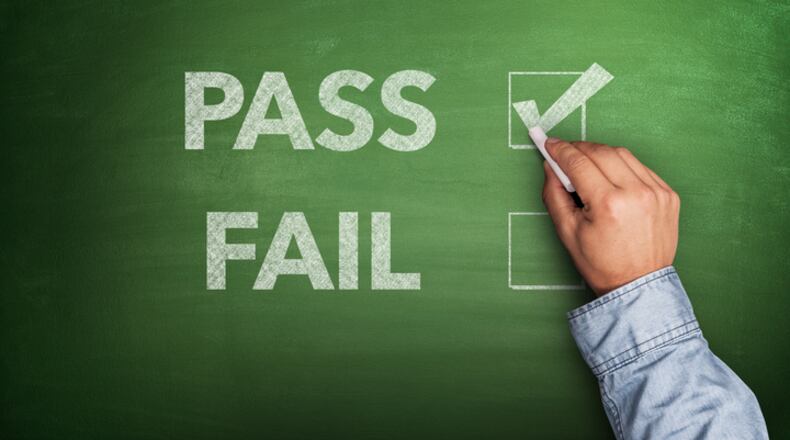State Rep. David Wilkerson, D-Powder Springs, will hold a virtual town hall on Facebook tonight at 7 to discuss the refusal of the University System of Georgia to offer college students a pass/fail option in the wake of the campus shutdowns and abrupt switch to online classes.
Joining Wilkerson will be members of the Georgia General Assembly and students.
To join the event, click here.
“It is necessary for elected officials to listen to the concerns and advocate on behalf of all of their constituents,” said Wilkerson. “Campuses across the country have made the decision to allow for an opt-in pass/fail grading system; it is important to hear why Georgia should follow suit.”
On social media this week, there are hundreds of comments from Georgia students expecting their GPAs to plummet from the rocky transition to online classes. I just read a batch of remarks from unhappy students dreading their first C's.
On social media and in emails to me, students are speculating the University System of Georgia wants students to crater so fewer keep HOPE. I don't believe that, but I am puzzled over the system's resistance to a pass/fail option given the documented challenges with internet access in rural Georgia.
Thousands of students, like the two from the University of Georgia who wrote today's guest column, are urging the USG to reconsider its rejection of an opt-in pass/fail grading system. There are multiple student petitions underway pleading for pass/fail.
In this column, Sydney Phillips a UGA sophomore from Douglasville, and Matthew Hall, a UGA School of Law student from Athens, outline why the state public colleges should adopt the pass/fail option. They are part of USG Students 4 Grade Reform.
By Sydney Phillips and Matthew Hall
USG Students 4 Grade Reform began as a coalition of undergraduate and graduate students from across the University System of Georgia's 26 institutions of higher learning. We are advocating on behalf of those students who have been disproportionately impacted by the COVID-19 pandemic.
Through direct outreach to USG and state of Georgia representatives, traditional media interviews, and a social media campaign, we have been highlighting all the reasons why an opt-in pass/fail grading system should be implemented.
But in our efforts to bring attention to the fact that this is an issue of equity, internet access became the focus of attention. Yes, a lack of access to high speed internet is a massive issue -- likely the most common issue, but it is not the only one.
That’s why we started the #VoicesofReason Campaign. It was birthed from our struggle to highlight the other hardships that students are facing and explain that an opt-in pass/fail system is the most comprehensive solution to alleviating some of these pressures. We chose to call our campaign #VoicesofReason because we wanted everyone to know that what we are asking for isn’t unreasonable.
More than 200 colleges and universities nationwide have adopted grading reforms for this semester, with all but four out of the top 148 public institutions following suit, according to U.S. News & World Report.
Three out of these four are USG schools. The other is Arizona State, a school with a massive online contingent that was far better prepared to adapt to the challenge of distance learning than we were.
The reasons we are advocating for equitable grade reform are as complex and diverse as the student bodies represented within the USG. In addition to widespread internet unreliability, students are dealing with poverty due to sudden job loss or parental income. And we have posted story after story of students who received COVID-19 diagnoses or were trapped overseas.
We have also shone a light on the valor of student caregivers. Many of our classmates are grappling with the sickness or death of a loved one due to the virus. Still others, especially graduate students, are now caring for children due to school and day-care closures.
International students who have had to return to distant time zones recount the struggles of having to wake up for Zoom classes in the middle of the night for weeks on end. Those international students who have remained in Georgia are worried about maintaining the grades they need to keep their visas.
Graduate and law students were also overlooked when this dialogue shifted to a focus on internet access. Law students are particularly vulnerable to the inequities stemming from the USG's failure to shift to pass/fail grading.
Because law students at the University of Georgia and Georgia State University are graded on a curve, and class ranks are assigned against one’s peers, the fact that some students are relatively sheltered from the pandemic, while others experience a combination of COVID-related issues, means students with secure access to resources could rank higher in their class primarily as a result of that privilege.
Unlike Emory's and Mercer's law schools, which have both switched to pass/fail, UGA's and GSU's law schools are in the extreme minority of schools who have not made this change. Because the USG is not allowing the state's public law schools to move to pass/fail, these schools have had to make alternate adjustments to their curves that fall within the USG's guidelines.
We hope that putting a spotlight on these issues will spark further conversations about the inequities that are plaguing our classmates and making academics difficult for students who might otherwise excel.
About the Author
The Latest
Featured





